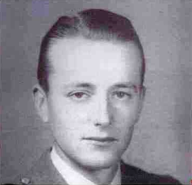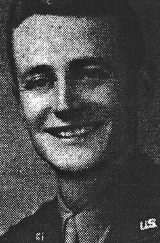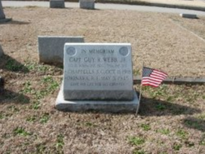Scroll of Honor – Guy Webb
Bloodiest Battle
In With the Old Breed, his classic memoir of combat in the Pacific Theater of World War II,  Eugene Sledge described the feelings of “utter helplessness” when enduring enemy shellfire on Okinawa. Guy Robert Webb, Jr. of Saluda was plunged into the muddy and bloody battle of Okinawa as an officer in the 77th Infantry Division.
Eugene Sledge described the feelings of “utter helplessness” when enduring enemy shellfire on Okinawa. Guy Robert Webb, Jr. of Saluda was plunged into the muddy and bloody battle of Okinawa as an officer in the 77th Infantry Division.
Guy Webb graduated from Clemson with a degree in civil engineering in 1941 and took a position with the South Carolina Highway Department. That job didn’t last long. Following the Pearl Harbor attack, Webb was ordered to active duty in 1942.
Webb was assigned to the 77th Infantry Division which was activated at Fort Jackson in March 1942. Two years later, the division set sail for Hawaii to join the assault on the Japanese Empire.
That fall, Webb and the 77th landed on Leyte Island in the Philippines as General MacArthur made good his pledge to return to the beleaguered archipelago. In combat on Leyte, Webb was awarded the Bronze Star medal.
In keeping with MacArthur’s island-hopping strategy, the 77th’s next campaign was in the Ryukyu Islands, the largest of which was Okinawa. US planners had targeted the island for the construction of airfields from which land-based Army Air  Forces planes would be able to support the anticipated invasion of the Japanese home islands.
Forces planes would be able to support the anticipated invasion of the Japanese home islands.
The landings on the island occurred on the quixotic convergence of Easter Sunday and April Fool’s Day in 1945. This largest amphibious operation of the Pacific War was initially unopposed by the Japanese who hoped to lure the Americans into a campaign so costly that US leaders would seek a negotiated settlement to a war the Japanese were clearly losing.
On May 1, the 77th moved into the line to replace the exhausted 96th Infantry Division. The 77th joined the 1st Marine Division in attacking the Shuri Heights a ridgeline which the Japanese defenders had fortified with concealed artillery, mortar and machine gun firing positions. On May 5, Captain Guy Webb was killed when a Japanese artillery shell scored a direct hit on his fox hole.
Japan’s Okinawa strategy was partially successful. By the time the campaign ended on June 22, it had become the bloodiest battle of the Pacific War, resulting in more than 240,000 deaths including nearly half of the island’s prewar civilian population and more than 14,000 American soldiers and Marines. But rather than pursuing peace talks, the Americans remained committed to forcing the Japanese into the unconditional surrender demanded by the late President Franklin Roosevelt.
Guy Webb was survived by his wife, the former Lucille Hope, his parents, two brothers, and a sister. In 1949,  his remains were returned to the United States and buried at Travis Park Cemetery in Saluda.
his remains were returned to the United States and buried at Travis Park Cemetery in Saluda.
For more information on Captain Guy Robert Webb, Jr. see:
https://soh.alumni.clemson.edu/scroll/guy-robert-webb-jr/
For additional information on Clemson University’s Scroll of Honor visit:
